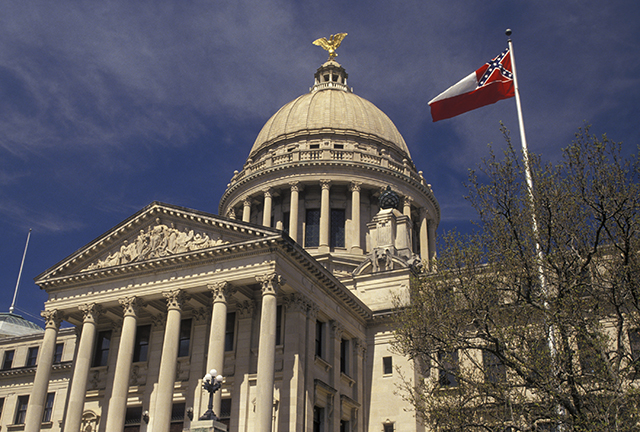In a victory for religious freedom, last week Mississippi Governor Phil Bryant (R) signed into law the state’s Religious Freedom Restoration Act.
The Mississippi law is based on the 1993 federal Religious Freedom Restoration Act (RFRA), which was sponsored by then-Rep. Chuck Schumer (D–N.Y.), and the late Senator Edward Kennedy (D–Mass.). Passed by an overwhelming majority in the Senate and unanimously in the House, RFRA was signed into law by then-President Bill Clinton. This federal law prohibits substantial government burdens on religious exercise unless the government can show a compelling interest in burdening religious liberty and does so through the least restrictive means.
By passing its Religious Freedom Restoration Act, Mississippi joins the 18 other states that have implemented RFRAs; 11 additional states have religious liberty protections that state courts have interpreted to provide a similar level of protection. These laws place the onus on the government to justify its actions in burdening the free exercise of religion.
Mississippi’s RFRA could provide individuals like Jagjeet Singh a way to challenge government actions that discriminate against sincere religious belief and expression. As the ACLU reports, Singh is a commercial truck driver and a devout Sikh who wears a traditional kirpan (a small, spiritual sword worn on the waist) and turban. Last year, when he pulled over his truck in Mississippi to fix a flat tire, “officers called him a ‘terrorist’ and harassed and humiliated him because of his appearance and religious beliefs.” After berating Singh, the officers eventually arrested him, claiming he had refused to follow their orders.
Later, when Singh was waiting for his hearing, officers demanded he leave the courthouse. The judge told Singh’s lawyer “that he had expelled Mr. Singh from the courtroom because of his turban. He further stated that Mr. Singh would not be allowed to re-enter the courtroom unless he removed ‘that rag’ from his head and threatened to call Mr. Singh last on the docket if he continued to wear the religious headdress.” Mississippi’s RFRA could provide protection against any attempts by the government to burden Singh’s religious exercise and expression.
The law could also help religious organizations like Opulent Life Church in Holly Springs, Mississippi. When Pastor Telsa DeBerry’s growing congregation became too large for its worship space, the church attempted to move to a larger facility—only to encounter discriminatory zoning laws that effectively prohibited Opulent Life from renting commercial space. While Opulent Life eventually found reprieve from the discriminatory city ordinance under federal religious land use protections, state-level protections are necessary to ensure local and state laws do not burden religious free exercise.
“The Mississippi Religious Freedom Restoration Act would provide legal protection for small churches like the Opulent Life Church that are discriminated against in ways not already protected by federal law or that do not qualify for federal protection,” notes DeBerry. The Mississippi RFRA, DeBerry explains, “would also protect individuals and non-church religious organizations who are discriminated against for their religious beliefs: college students forced to violate their religious beliefs in order to pass a class, charities told that they may not share food with the poor, or nurses forced by a public hospital to perform abortions.”
Protections for religious freedom, like the one passed in Mississippi, provide a commonsense way to balance the fundamental right to religious liberty with compelling government interests. There will be times when a state or federal government can show it has a compelling reason for burdening religious expression—to ensure public safety, for instance. But RFRAs set a high bar for the government to meet in order to restrict religious freedom.
A robust conception of religious liberty provides every person the freedom to seek the truth, form beliefs, and live according to the dictates of his or her conscience—whether at home, in worship, or at work. Those fundamental beliefs cannot be lightly discarded and they should not be unreasonably and unnecessarily burdened by the government.
Fortunately, citizens of Mississippi now have greater protection of their fundamental right to live out and express their faith.
